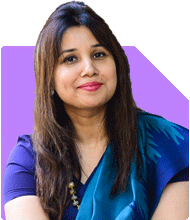Aruna Agarwal | Answer |Ask -Follow
Child and Parenting Counsellor - Answered on Sep 08, 2023
She has a master’s degree in psychology with a specialisation in behaviour analysis. She focuses on children between the ages of 2-10 years who face challenges related to behaviour, language development or attention issues and providing them with the right life skills.
Agarwal is the owner of Kidzee, a pre-primary school, and Mount Litera Zee School that caters to primary students.... more

Hello Doctor, My daughter presently is in Std. 10th, she is a responsible person, she studies and scores around 75% and the same in 9th Std. The first unit test of Std.10th was not so good to her as she scored less marks in two subjects (around 6 and 7 out of 20). I asked her what is going in her mind the she opened up stating that she has the fear of obtaining good marks while writing the paper. I told her that don't think of the marks, if you study, revise well and calmly answer the paper without any hurry then definitely you will score good. However, nowadays, my husband always scolds her to study, study or talk to her that there is no use of studying you, what will happen to you, all negativity and she is in depression and told me that I feel to die. I convinced her not to think like that and to ignore her father talks and concentrate on your studies and told that I am there with you always. I require your guidance how can I keep her positive in her minds with positive vibes as she gets irritated with the situation my husband creates. Thanking you Regards, MS
You can convince her and explain that it's not important how much she scores ,it's about evolving herself each day and do better than what she did previously.
You may like to see similar questions and answers below
Archana Deshpande | Answer |Ask -Follow
Image Coach, Soft Skills Trainer - Answered on May 06, 2024
Anu Krishna |1754 Answers |Ask -Follow
Relationships Expert, Mind Coach - Answered on Jul 02, 2024
Ramalingam Kalirajan |10908 Answers |Ask -Follow
Mutual Funds, Financial Planning Expert - Answered on Dec 20, 2025
Ramalingam Kalirajan |10908 Answers |Ask -Follow
Mutual Funds, Financial Planning Expert - Answered on Dec 20, 2025
Naveenn Kummar |237 Answers |Ask -Follow
Financial Planner, MF, Insurance Expert - Answered on Dec 20, 2025
Ramalingam Kalirajan |10908 Answers |Ask -Follow
Mutual Funds, Financial Planning Expert - Answered on Dec 19, 2025
Nayagam P P |10859 Answers |Ask -Follow
Career Counsellor - Answered on Dec 19, 2025
Ramalingam Kalirajan |10908 Answers |Ask -Follow
Mutual Funds, Financial Planning Expert - Answered on Dec 19, 2025
Ramalingam Kalirajan |10908 Answers |Ask -Follow
Mutual Funds, Financial Planning Expert - Answered on Dec 19, 2025
Ramalingam Kalirajan |10908 Answers |Ask -Follow
Mutual Funds, Financial Planning Expert - Answered on Dec 19, 2025
Radheshyam Zanwar |6751 Answers |Ask -Follow
MHT-CET, IIT-JEE, NEET-UG Expert - Answered on Dec 19, 2025
Radheshyam Zanwar |6751 Answers |Ask -Follow
MHT-CET, IIT-JEE, NEET-UG Expert - Answered on Dec 19, 2025

























